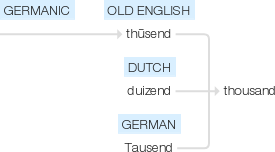Thousand
Old English thūsend, of Germanic origin; related to Dutch duizend and German Tausend .
wiktionary
From Middle English thousend, thusand, from Old English þūsend(“thousand”), from Proto-West Germanic *þūsundi, from Proto-Germanic *þūsundī(“thousand”), (compare Scots thousand(“thousand”), Saterland Frisian duusend(“thousand”), West Frisian tûzen(“thousand”), Dutch duizend(“thousand”), German tausend(“thousand”), Danish tusind(“thousand”), Swedish tusen(“thousand”), Norwegian tusen(“thousand”), Icelandic þúsund(“thousand”), Faroese túsund(“thousand”)), from Proto-Indo-European *tuHsont-, *tuHsenti- (compare Lithuanian tūkstantis(“thousand”), Russian ты́сяча(týsjača)).
etymonline
thousand (adj., n.)
"10 times one hundred; the number which is ten times one hundred; a symbol representing this number;" Old English þusend, from Proto-Germanic *thusundi (source also of Old Frisian thusend, Dutch duizend, Old High German dusunt, German tausend, Old Norse þusund, Gothic þusundi).
Related to words in Balto-Slavic (Lithuanian tūkstantis, Old Church Slavonic tysashta, Polish tysiąc, Russian tysiacha, Czech tisic), and probably ultimately a compound with indefinite meaning "great multitude, several hundred," literally "swollen-hundred," with first element from PIE root *teue- "to swell," second element from PIE root *dekm- "ten."
Used to translate Greek khilias, Latin mille, hence the refinement into the precise modern meaning. There was no general Indo-European word for "thousand." Slang shortening thou first recorded 1867. Thousand island dressing (1916) presumably is named for the region of New York on the St. Lawrence River.
